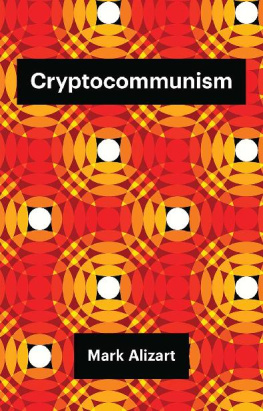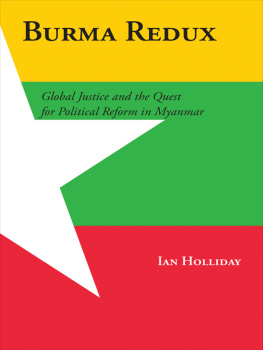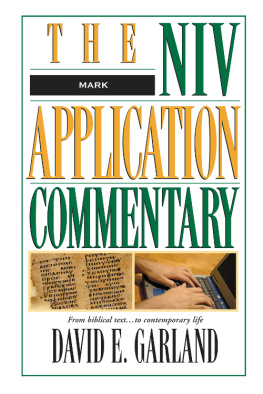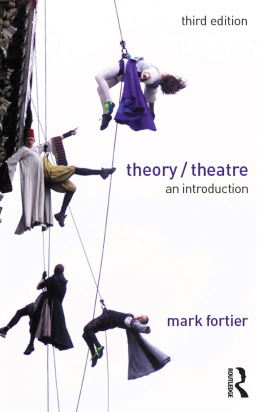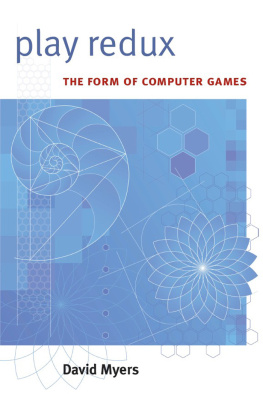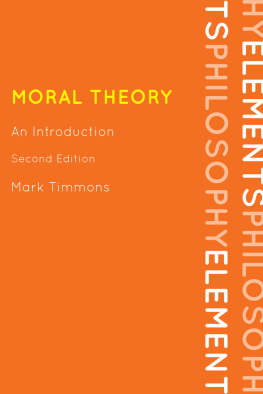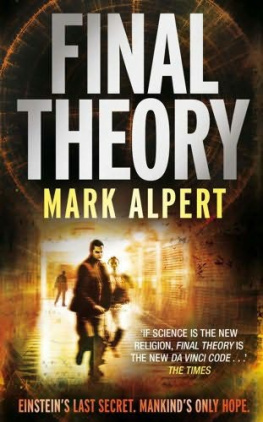Contents
Theory Redux series
Series editor: Laurent de Sutter
Published Titles
Mark Alizart, Cryptocommunism
Armen Avanessian, Future Metaphysics
Franco Berardi, The Second Coming
Alfie Bown, The Playstation Dreamworld
Laurent de Sutter, Narcocapitalism
Roberto Esposito, Persons and Things
Graham Harman, Immaterialism
Helen Hester, Xenofeminism
Sreko Horvat, The Radicality of Love
Dominic Pettman, Infinite Distraction
Nick Srnicek, Platform Capitalism
Cryptocommunism
Mark Alizart
Translated by Robin Mackay
polity
Copyright Mark Alizart 2020
This English edition Polity Press, 2020
Polity Press
65 Bridge Street
Cambridge CB2 1UR, UK
Polity Press
101 Station Landing
Suite 300
Medford, MA 02155, USA
All rights reserved. Except for the quotation of short passages for the purpose of criticism and review, no part of this publication may be reproduced, stored in a retrieval system or transmitted, in any form or by any means, electronic, mechanical, photocopying, recording or otherwise, without the prior permission of the publisher.
ISBN-13: 978-1-5095-3859-1
A catalogue record for this book is available from the British Library.
Library of Congress Cataloging-in-Publication Data
Names: Alizart, Mark, author.
Title: Cryptocommunism / Mark Alizart ; translated by Robin Mackay.
Other titles: Cryptocommunisme. English
Description: Cambridge, UK ; Medford, MA : Polity Press, [2020] | Series: Theory redux series | Includes bibliographical references and index. | Summary: The communist manifesto for the age of Bitcoin-- Provided by publisher.
Identifiers: LCCN 2020004522 (print) | LCCN 2020004523 (ebook) | ISBN 9781509538577 (hardback) | ISBN 9781509538584 (paperback) | ISBN 9781509538591 (epub)
Subjects: LCSH: Communism and technology. | Cryptocurrencies--Philosophy. | Value--Philosophy.
Classification: LCC HX543.5 .A4513 2020 (print) | LCC HX543.5 (ebook) | DDC 332.4--dc23
LC record available at https://lccn.loc.gov/2020004522
LC ebook record available at https://lccn.loc.gov/2020004523
The publisher has used its best endeavours to ensure that the URLs for external websites referred to in this book are correct and active at the time of going to press. However, the publisher has no responsibility for the websites and can make no guarantee that a site will remain live or that the content is or will remain appropriate.
Every effort has been made to trace all copyright holders, but if any have been overlooked the publisher will be pleased to include any necessary credits in any subsequent reprint or edition.
For further information on Polity, visit our website: politybooks.com
Communism = Soviets + Electricity
Lenin
Acknowledgements
My thanks first of all to Laurent de Sutter, for the trust he placed in me by accepting this book into his collection. I would also like to express my gratitude to John Thompson and Polity Press, to my translator Robin Mackay, and to the readers who agreed to reread my manuscript and helped guide my thinking: Brune Compagnon-Janin, Anthony Masure, Aliocha Imhoff and Kantuta Quiros, Mathieu Potte-Bonneville, as well as Odile Lakomski-Laguerre, Jacques Favier and Adli Takkal Bataille.
Introduction: The Institution of Liberty
Cryptocurrencies are often deemed revolutionary and, indeed, Bitcoins manifesto shares striking similarities with the most prominent revolutions in history. Satoshi Nakamotos vision that it is possible to trade without bankers as intermediaries cannot but remind us of Martin Luthers claim that believers can entertain a direct relationship with God without priests as intermediaries, which in 1517 kickstarted the Protestant Reformation. It has a similar feel to the declarations of Oliver Cromwell, George Washington and Maximilien de Robespierre, according to which the people can govern themselves without princes as intermediaries, declarations that gave rise to the great political revolutions.
Obviously, the Bitcoin White Paper doesnt tell us how to obtain eternal life like the Reformation did, and the petty calculations of small investors worried about their savings seem to have little in common with the struggle for liberty, so one might well doubt whether any of this goes beyond a vague resonance, and whether Bitcoin really promises the same kind of disruptions as those earlier revolutions. But it would be a great mistake to overlook cryptocurrencies because they are just about money. Finance is anything but trivial. The economy is not only a fundamental aspect of our societies; in some senses it is the continuation of the religious and political spheres by other means.
Holy communion wafers are shaped like coins because originally both were cast in the same moulds. And it is also the Protestant concept of faith, in the sense that implies trust and letting go, and therefore being free , that supported the construction of liberal democracies and allowed them to emancipate themselves from monarchy.
In fact, Satoshis invention, insofar as it also deals in trust and faith, is a substantial and worthy heir to the theological-political history of the West that runs from the Reformation to liberal democracy. It may even represent its fulfilment, for whereas reformation and revolution were based in a subjective concept of faith, Bitcoin is an algorithm of faith. Because it allows mathematical emancipation from trusted third parties, it is a machine for producing faith and liberty.
This having been said, revolutions are also plagued by misconceptions, and the cryptorevolution is no exception; Cryptocurrency fanatics we use the word advisedly, since it is indeed a new religion and a new party may be in for a disappointment regarding their beliefs. The cryptorevolution might spell the end of the international financial system as we know it, but it wont end all misery and injustice, neither will it give birth to a brave new world of empowered individuals freed from paying taxes and obeying the law the story that a great many libertarian prophets, alt-right bitcoiners and cryptocultists like to tell. If revolutions of the past teach us something, it is that emancipation, freedom and liberty have a very special way of coming up with new obligations and even, sometimes, woes.
Certainly, during the Middle Ages peasants gathered around Reformation gurus such as Thomas Mntzer, who had deduced from Luthers theses that it was now possible to live free of all moral and clerical authority. And there were revolutionary enrags who believed that their newly gained freedom gave them the right to cut off as many heads as they wanted, especially those raised above their own. Eventually though, all of them would discover sooner rather than later that they were mistaken about the deeper meaning of the Reformation and the Revolution. Protestantism was to introduce even more rigour into religion than Catholicism, to the point where Protestants would end up being known as Puritans. Priests were abolished, cathedrals, altars, incense and Church Latin destroyed, replaced by a religious practice that did away with all visible signs only to become all the more ascetic, demanding to be observed at all times and in every aspect of secular life. Similarly, democracy would prove to be even more complex and convoluted than the ancien rgime . The princes were cast out, only for bureaucracy to run rampant, with swarms of civil servants and lawbooks thicker than the dictionary and telephone book combined.
Now, it might be argued that the return of Church and State following the Reformation, and the liberal revolutions that had attempted to destroy them, means that they failed at what they set out to do and that the real, proper revolution is yet to come. But the truth is that this return was a feature, not a bug. Luther didnt want to overthrow the law of God, he wanted to fulfil it; Rousseau didnt want the rule of nature to replace the rule of men, he wanted to ensure that the rule of men would be duly observed and carried out. In fact, they had both understood that liberty is paradoxically the best way to enforce the word of God and the rule of men, because ultimately it consists not in being free from all laws, but in freely imposing laws upon oneself, as the word autonomy clearly suggests: a law ( nomos ) imposed upon oneself ( auto ).

